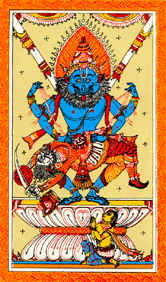A Commentary on Philosophical Misconceptions
 Misconception: Rejecting the Sastra
Misconception: Rejecting the Sastra
"I don't care what the sastra says. Prabhupada has given us the siddhanta !" (Spoken by a leading sannyasi, Disappearance observances of Sripad Gaura Govinda Maharaja, Bhagavatam class, Bhuvaneswara, India, 1996.)
Commentary
In the above statement by His Holiness we find two particular elements which are extremely unfavorable for the natural development of Krishna consciousness and the final attainment of prema-bhakti or love of God: nama-aparadha and atheism.
The fourth offense, nama-aparadha, to the holy name of Krishna is to blaspheme, vilify, or reject the Vedic literature or literature written in pursuance of the vedic version, sruti-sastra-ninda. To say that one does not care for the sastra is to commit the fourth offense against the holy name. If a devotee makes this offense, especially on a re-occurring basis, it should be understood that such a devotee does not know the meaning or the value of the sastra despite his being initiated by a most highly qualified spiritual master.
If a devotee does not understand the meaning of the sastras then he should surrender to the lotus feet of the spiritual master and receive his expert guidance. If the spiritual master is not available to guide the disciple then the disciple should surrender to the lotus feet of a genuine sadhu who is fully conversant with the purport of the sastra and receive his expert guidance.
These three things are always there to guide the fallen conditioned souls: guru, sadhu, and sastra.
To a neophyte disciple there may appear to be contradictions between guru, sadhu, and sastra but such contradictions are only apparent not real. Seeing an apparent contradiction between guru, sadhu, and sastra a neophyte devotee sometimes rejects either the guru, the sadhu, orthe sastra. This is certainly an unfortunate occurance and this sometimes causes the devotee to fall down.
The sastra and the Bhagavata in particular is full of descriptions of the Supreme Personality of Godhead and His pure devotees. The guru and the sadhu, who are also known as the devotee Bhagavata, lead their lives strictly in accordance with the book Bhagavata. Thus it is said that the book Bhagavata or the sastra, and the devotee Bhagavata are identical.
Both the sastra and the guru or sadhu are direct representatives of the Supreme Personality of Godhead, Krishna. Therefore, a devotee should give his highest respect to guru, sadhu, and sastra. Not only respect but one must have complete faith in guru and sadhu if one at all wants to know the meaning of the sastra. Therefore, if even after years of practicing bhakti-yoga a disciple cannot understand the sastra it should be understood that he does not have complete faith in the guru.
yasya deve para bhaktir
yatha-deve tatha gurau
tasyaite kathita hy arthah
prakasante mahatmanah
"Only unto those great souls who have implicit faith in both the Lord and the spiritual master are all the imports of vedic knowledge automatically revealed."
If someone rejects the sastra not caring for the direction given therein then that person is automatically rejected by the spiritual master and can be considered a pasandi or an offender. The Buddhists have rejected the sastra and therefore they have been rejected by the Vaishnava acharyas as pasandi or atheistic. The common ground for all atheistic persons is that they reject the sastra.
Atheistic persons reject the sastra in either of two ways. The first class of atheists rejects the sastra completely not caring for it at all. Whereas the second class of atheists externally accept the sastra but they give their own speculative interpretation. This first class of atheists are the Buddhists and the second class of atheists are typically the followers of Shankaracharya. Buddha rejected the sastra entirely whereas Shankaracharya gave his own imaginary interpretations to the sastra. Of the two, Sri Chaitanya has said, "vedasraya nastikya-vada bauddhake adhika ", "Those who have taken shelter of the Vedas, yet preach agnosticism (Mayavadis ) are worse than Buddhists." A half truth is worse than no truth at all.
In conclusion it must be said that although the orator of the statement under consideration is indeed a practicing Vaishnava, his statement rejecting the sastra should itself be rejected because it does not align with the proper Gaudiya Vaisnava Siddhanta.